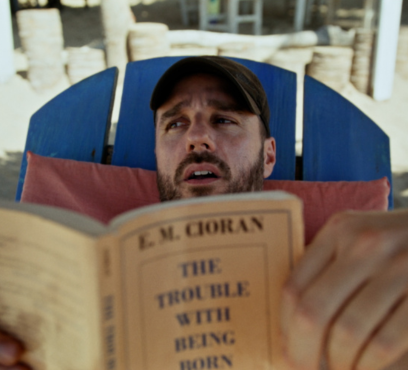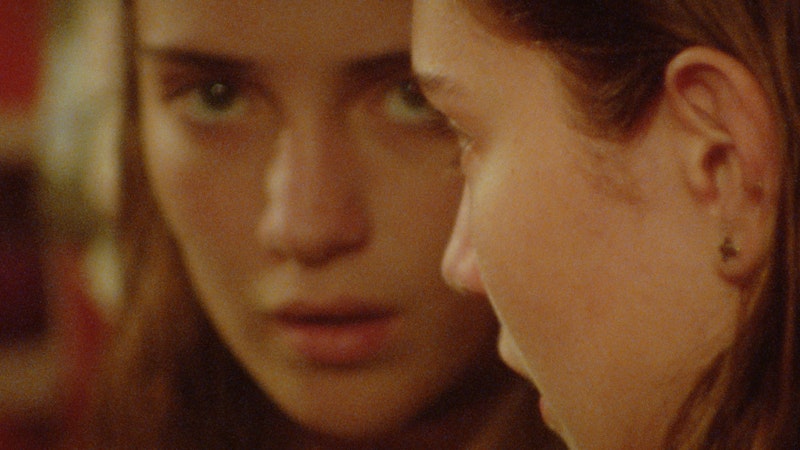
Rot curdling its subject into nothingness is a real drag of a process. The first stage of human decomposition is the body’s digesting itself, or autolysis. When the heart stops, and all bodily functions fail, the fluids, gas, and waste marinate into an acidic, barely-human warzone. The skin loosens and gleams, blisters and bloats. Putrefaction gives the dead body its revealing smell. It would take one month for the human body to fully decompose into liquified remnants, like the moldy, rotten residue a buckling pumpkin leaves behind.
In “Rotting in the Sun“, you watch a tarped body rot, exposed by the delicate, open surgeries of a circling vulture that helps it along its process toward liquefaction. The mysterious circumstances behind the body left to bake in the sun atop a rooftop simultaneously bubble up and rot from inside everybody who played a part in it; guilt and dishonesty do not sit well in a stomach.
Sebastián Silva’s 2023 feature turns out to be one of the most refreshing takes on modernity. Dark comedy is paired perfectly with the imperfections of social media, fame and influence, unchecked privilege, strung-out sex, and heavy drug use in this nihilistic minefield. Silva inserts the relentless content that saturates the world today and gives a firsthand testimony of what becomes of it.
Silva and co-star Jordan Firstman use their genuine personalities to build dramatic, believable caricatures. Silva needs a break from his artistic k-hole, ketamine dissociation, in Mexico City, so he opts for the ultimate sunbathing getaway – a nudist beach in Zicatela. Firstman’s character is a social media influencer, making unfunny jokes online and engaging in consistent, meaningless sex until he decides to collaborate with Silva on a television series after their life-or-death introduction at Zicatela. Silva is in a suspended state of decay throughout the film, constantly looking for the chance to leave his body. He gets what he asks for with the help of ketamine and Vero, his underappreciated housekeeper – played by the incredible Catalina Saavedra.
A central element of the film is a bottled drug made legal only in a select few places, including parts of Mexico, that has the power to euthanize, mainly used to put down dogs. It is also taken by humans with a death wish. Silva’s uncaring building-owner Mateo pushes the idea of it down his throat. Pentobarbital is the forbidden, poisoned apple from the tree of Silva’s Eden. With the power to transport Silva away from his feelings, as well as everything he knows, inspires, and loves at his fingertips, “Rotting in the Sun” is a rumination on wishing for, yet postponing death. The film occasionally dances with the possibility of becoming tedious, but like the slow process of rot and the sign of the tedium times, its pace is miserable and intentional, stonewashed by the shock value of each story beat.
It is rare for a film to center around flawed, gay characters without making their sexualities comprise the entirety of the plot. Representation tends to fall flat and ultimately feel one-sided, subtextualized, or recycled, but Silva is not afraid to probe the male form and explore
the physicality of masculinity in his filmmaking. Full-frontal nudity and unapologetic, unsimulated gay sex, though jarring at times, acts as a burgeoning stomp forward in cinematic representation. The film only uses its accurate, unflinching portrayals in instances where the plot progresses. Nothing is explicit for the sake of being explicit, but for the sake of being sincere.
Silva uses his suicidal fantasies as a means of actively steering the story’s trajectory. In a Variety interview, Silva says, “My deathwish is fully exposed in the movie for everybody to envy it or follow it.” Crafting a lightly fictionalized characterization of himself not only makes for a unique perspective in cinema, but it becomes a vehicle for self-transformation and liberation for Silva, who puts his depression in the sunlight to examine it and to “fictionalize it, so I could maybe leave it.” Silva writes what he knows in a world that he knows, which makes “Rotting in the Sun” so successful, so personal, and so relevant.
In such a damp, sick, and superficial environment, how can anything but rot flourish?
Silva’s tenth feature will forever distinguish the time in which it was made. Modern life breeds blind consumption and mass corruption. “Rotting in the Sun” mirrors life in a k-hole, whether it be induced by the influx of all-consuming online content, the arsenal of drugs available, empty hook-up culture, or the depression that follows. The film’s lack of empathy and selfishness serve as a reminder to sink your fingers in and dig through the state of things, lest the rot creep in through our very screens.
“Rotting in the Sun” is now available on Mubi
4 out of 5 stars

















